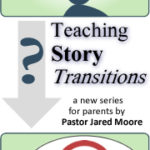Teaching Story Transitions 6: Launching Teens Into Culture
(If you’re a parent, it takes time to teach your children how to engage with the culture and stories around them. The same is true if you’re coauthoring a blog series on how parents might better do this! We now present the conclusion of the Teaching Story Transitions series.)
Starting last summer, we hoped to answer two questions. First: How can Christians avoid jumping directly from “let your parents shelter you” to “parents, shelter your children,” with little emphasis on what transitions come between? Second: How might parents adapt the “trivium” method of classical education to teach enjoyment and discernment of stories?
We have explored un-Biblical and unhelpful “discernment” extremes, practicing personal discernment before discernment on behalf of others, and overviewed our practical motives based on knowing and loving God’s Story, the Bible. Then came our Trivium outline with its first two stages: for younger children, Early Tools for Truth, and for older children, Middle-Grade Exploration. Now we come to the final teaching phase, as children grow into adults.
Expanding the Trivium: Word and Image
However, both of us want to change the classical trivium a bit, by expanding its categories to cover how people use their minds to interact with all of life. We’ve noticed that classical education proper often focuses on words in books and less on pictures, videos, etc. So we suggest that in this final stage, parents must train older children (or teens, youth, whatever your favorite term) to approach all of life — including visual media — with discernment.
Here we find some objections. Some Christian pundits and scholars believe human minds must focus mainly on word-based communications and descriptions rather than seeing images. Images, they believe, are a lower form of communication that leads to passivity.1
But this needn’t be true for discerning minds. After all, culture is full of both words and images. So is Scripture itself, in which the Word (Christ) is also the image of the invisible God (Col. 1:15), and though He does use words, yet often to encourage images. If we don’t address this, we will incidentally teach children to fear, trivialize, or even succumb to shallow, passive entertainment. So instead we should teach children to approach all of life — all stories, media and communications — as things with which we glorify and enjoy God.
This is especially vital for teenagers as they approach their adulthood. Parents may react as if teens should not enjoy, say, movies over books. The real problem is if youths are passively enjoying either form of storytelling — if they are simply sitting back and letting the product master them. Biblical discernment doesn’t enforce words over image or some media over others; it encourages us all to bring Jesus with us as we participate in any form of culture.
With that annotation complete, let’s explore the final stage of the (adjusted) trivium.
3. Launching teens into culture: Gradually release your grown children to discern and enjoy media and stories as adults.
The classical trivium’s final stage is known as the “rhetoric” stage. It starts in a person’s early teenage years and ends when her or she becomes an adult.
Yes, parents often dread the teenage years — that’s the stereotype, anyway — because here teens begin naturally to break away from parents’ authority. We do have a different view here than some Christian parents, for we believe this breaking away from parents is a natural stage in human development — that is, God-designed — that should not be stifled.
Of course, because we’re all sinners, sin often distorts this period into a rebellious time.
But youths and parents should both be encouraged, first, that youths can honor their parents while still pursuing adulthood; second, that parents can help their teenage children become God-honoring adults, rather than end up stifling their pursuit of adulthood.
Yes, parents may not like this, but if Christ tarries His coming and our children continue living, they will become adults. So we must help them by encouraging them to slowly break away from our authority — not for rebellion, but for God’s glory. Our children must learn to think for themselves and argue for themselves in adulthood. Thus, we must train them to think through others’ arguments, emotional appeals, logic use or misuse, and stories, and enjoy and discern them — and be able to reject and rebut what they see that isn’t of God.
In other words, instead of stifling a teenager’s argumentative impulse, let’s encourage them to harness that impulse for God’s glory. And in teaching them to discern and argue, let’s be careful to teach them to love God and their neighbor through this process (Matt. 22:37-39).
First, train teens to interpret accurately what others are saying.
Teens must be able to recognize what stories and media are arguing, and engage these ideas with a consistent Christian worldview (based always in Scripture).
In the words of John Piper, “Do unto authors as you would have them do unto you”2 Piper calls this “thinking an author’s thoughts after him”3, and though he applies it mainly to nonfiction, this is also the golden rule of reading, watching, observing, and listening to plays, movies, novels, songs, and any other story-based product.
By striving to understand what authors are and are not saying4, youths practice loving our neighbors as ourselves. They avoid the sinfully easy way to defeat an argument: creating and “defeating” a straw man — which only means defeating ourselves and in the process hiding the glory of God. Furthermore, this avoids attributing a belief to someone that he or she has not argued — to put it starkly, the sin of lying. Youths must know Christ will hold them accountable for every idle word they’ve said or typed (Matt. 12:36) — even if the story or other media product is made by sinful people and advocates sin.
Second, train teenagers to avoid needlessly offending others.
This truth has broader applications for general apologetics, yet applies equally to how teens learn to engage and debunk the stories and media they’ve heard. One of us (Stephen) vividly recalls practicing the wrong sort of media discernment in 2004, when he challenged someone who was reading the popular yet silly religious-conspiracy novel The Da Vinci Code. It was a “drive by” “discernment,” like Proverbs’s fool’s lips walking into a fight.
Christian teens, due to their legitimate joy in Christ and desire to uphold truth, can easily insult others. Like parents, teens may find other false worldviews absurd and inconsistent, because they often are. But we must recall that we too were once lost — and thus also preposterous and inconsistent. Only by God’s grace have we been saved (Eph. 2:8-9).
Moreover, we must make sure that if anything it’s the truth we share that offends hearers and not our rhetoric. One of my (Jared’s) professors, Stephen Wellum, ripped several of my papers apart in seminary due to my rhetorical garnish. We ourselves struggle with this, so it’s even more essential to remind teenagers that truth, God’s Word, “is living and active, sharper than any two-edged sword, piercing to the division of soul and of spirit, of joints and of marrow, and discerning the thoughts and intentions of the heart” (Heb. 4:12). But our rhetoric is not. We don’t mean to diminish the power of excellently crafted words, only to exalt the word of God to its proper place. After all, the Gospel (the good news, the message of Christ) is the power of God for salvation to everyone who believes (Rom. 1:16).
Third, train teens to compare other worldviews to the Christian worldview.
Hopefully by now your teens have a basic understanding of logic, thanks to God’s Word and its application, and to the Trivium’s first two stages. Teens must take what they’ve learned and apply this to other worldviews, asking and answering questions such as these:
- What is the author’s or storyteller’s worldview?
- What arguments, images, and other art aspects reveal the author’s worldview?
- What lies (anything that disagrees with God’s Word) does he or she tell?
- What half-truths does the storyteller share — i.e., truth the storyteller does not connect to God, such as “You shouldn’t murder”?
- What total truths — truth connected to God in light of Christ — does he or she tell?
- Is the author’s worldview consistent with reality? That is, can or does a human being consistently apply this worldview to all areas of life?
- Can the author’s worldview sustain his or her arguments? Why or why not?
Fourth, train teens to craft compelling interactions and responses.
Of course, parents don’t need to force teens to write papers in response to media, stories and other pop culture because verbal conversations will suffice. In conversations, parents could ask the above questions, then discuss how to engage others’ worldviews. If the other view is inconsistent, then a thesis could be, “Bob’s worldview is inconsistent because …”, and then specific points. The rest of the conversation (or formal paper) would accurately represent others’ beliefs, then show why the Christian worldview is more consistent.
Again, the goal of the rhetoric stage is this: First, accurately represent other worldviews. Second, do not offend others needlessly. Third, compare and contrast other worldviews with Christianity. Fourth, rebut the view in a compelling way that is faithful to Scripture.
Series finale
Will this work perfectly, every time, every time it’s tried on your current or future children?
We don’t promise that. Some of this series is based on our own experience; some is closer to theory. But we’ve done our best to ground this in Biblical discernment, and to discern other modes of “discernment” that we find anti-Biblical. And we’ve striven to allow for what classical Christian educators have found works well with children’s natural growth.
But whether or not you follow a classical or classical-derived education model, these truths remains: that all of life and culture is grace-mixed idolatry. We cannot approve or reject certain stories, or other products for any reason other than careful, Biblical discernment. And we must enjoy stories only for the purpose of enjoying God Himself.
Therefore, let’s train our children to extract grace from idolatry and to connect this grace to its rightful owner: God. Teach them to reject lies of the flesh, the world, and Satan, and to connect God’s truth to Him by the creating, sustaining, and redeeming work of Christ.
- For more on this false dichotomy, see resources such as Popologetics by Ted Turnau. ↩
- Think, John Piper, p. 45. ↩
- Ibid, 45. ↩
- Ibid, 45. ↩









































You talk quite a bit about author intent, but I question whether it’s quite so important. What the author intends usually amounts to a hill of beans in how people — and culture — react to it. Tolkien got a big kick into popularity because hippies liked the idyllic Shire, but Tolkien really did not like the hippies or their interpretation.
Or “Twilight.” It’s pretty polarizing. As far as I’m aware, Stephenie Meyer just meant to write a romance, not enrage vampire fans by shifting the genre into annoying, sparkly directions.
Or “The Grapes of Wrath.” Maybe once upon a time it was cool because it was socialist, like what Steinbeck intended, but the reasons it’s stayed cool have more to do with the “mythic realism,” as my professor called it (which he distinguished from “magical realism,” which is more of a postmodernist thing), and, less importantly, the “inter-chapters” where he shifts to waxing (annoyingly) lyrical about turtles and landscapes and suchlike.
Just look up “reader-response criticism.” Nobody I’ve met has claimed that it’s the end-all-be-all of literary criticism, but it tends to produce things worth discussing.
This final part does come at the end of a six-part series, which (for various reasons) has stretched over a year. So we may have covered authorial-intent versus reader-response in previous parts. If not, then yes, I’d certainly agree that because authors are working with the “raw materials” of God’s world, often truths can come through, beside and against, their intentions.